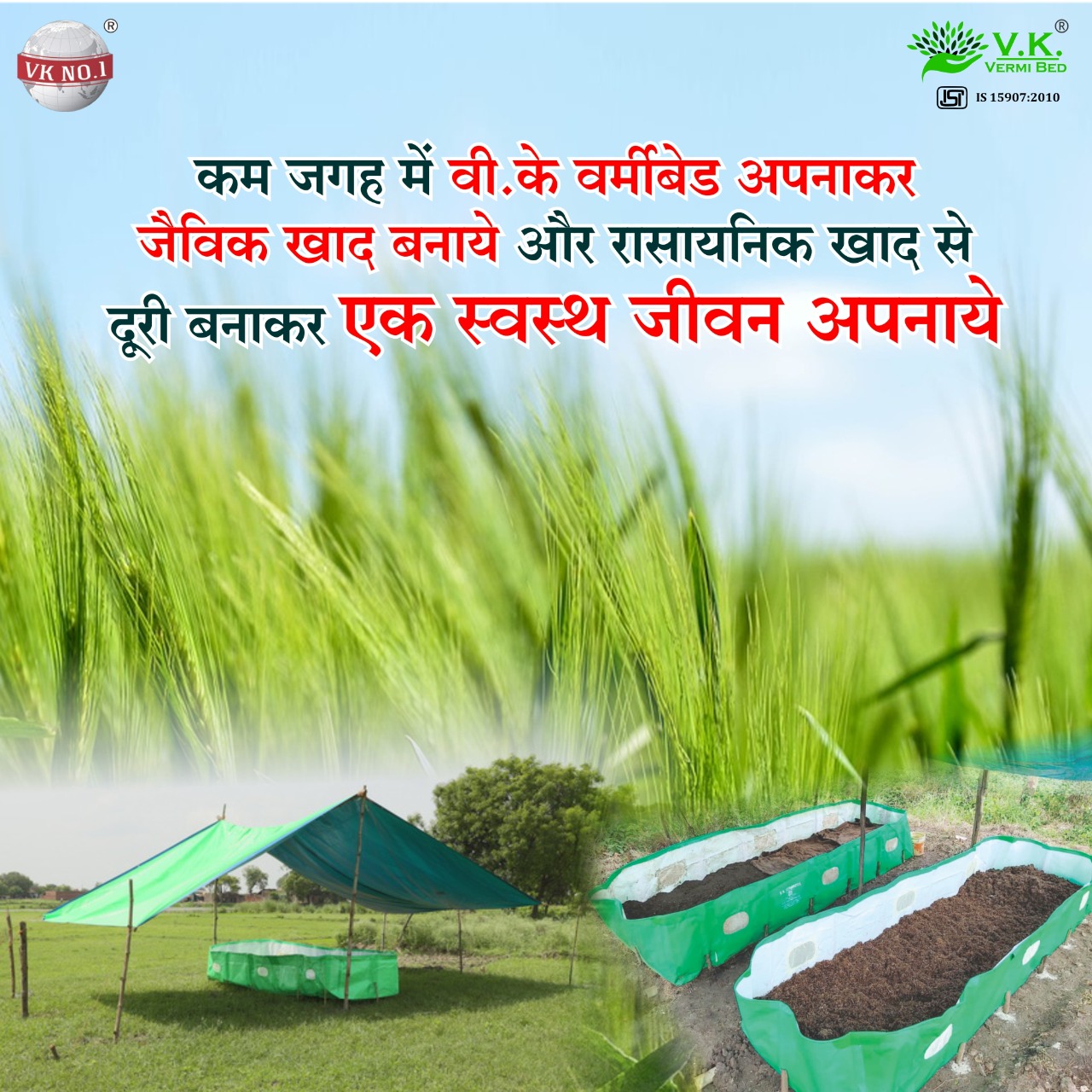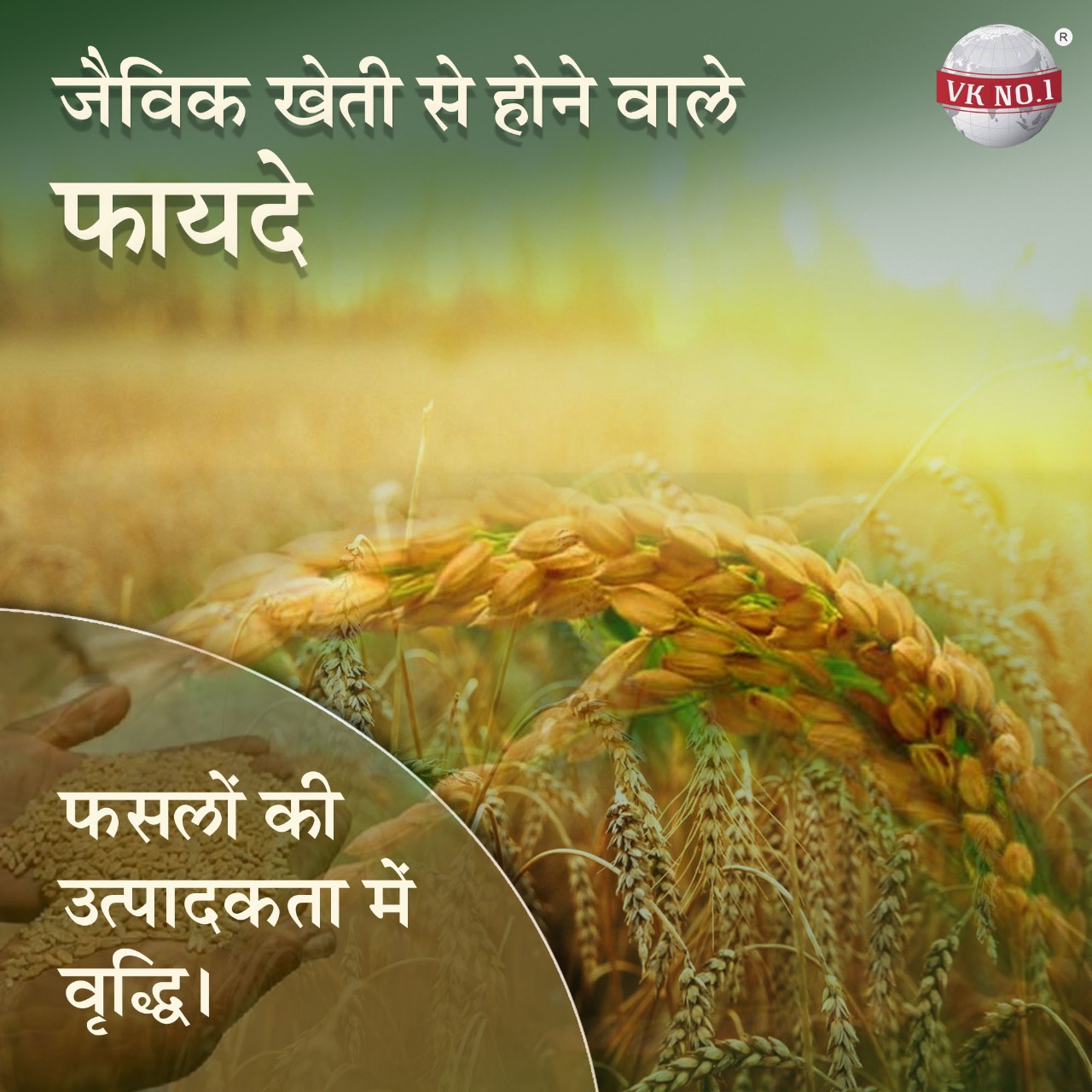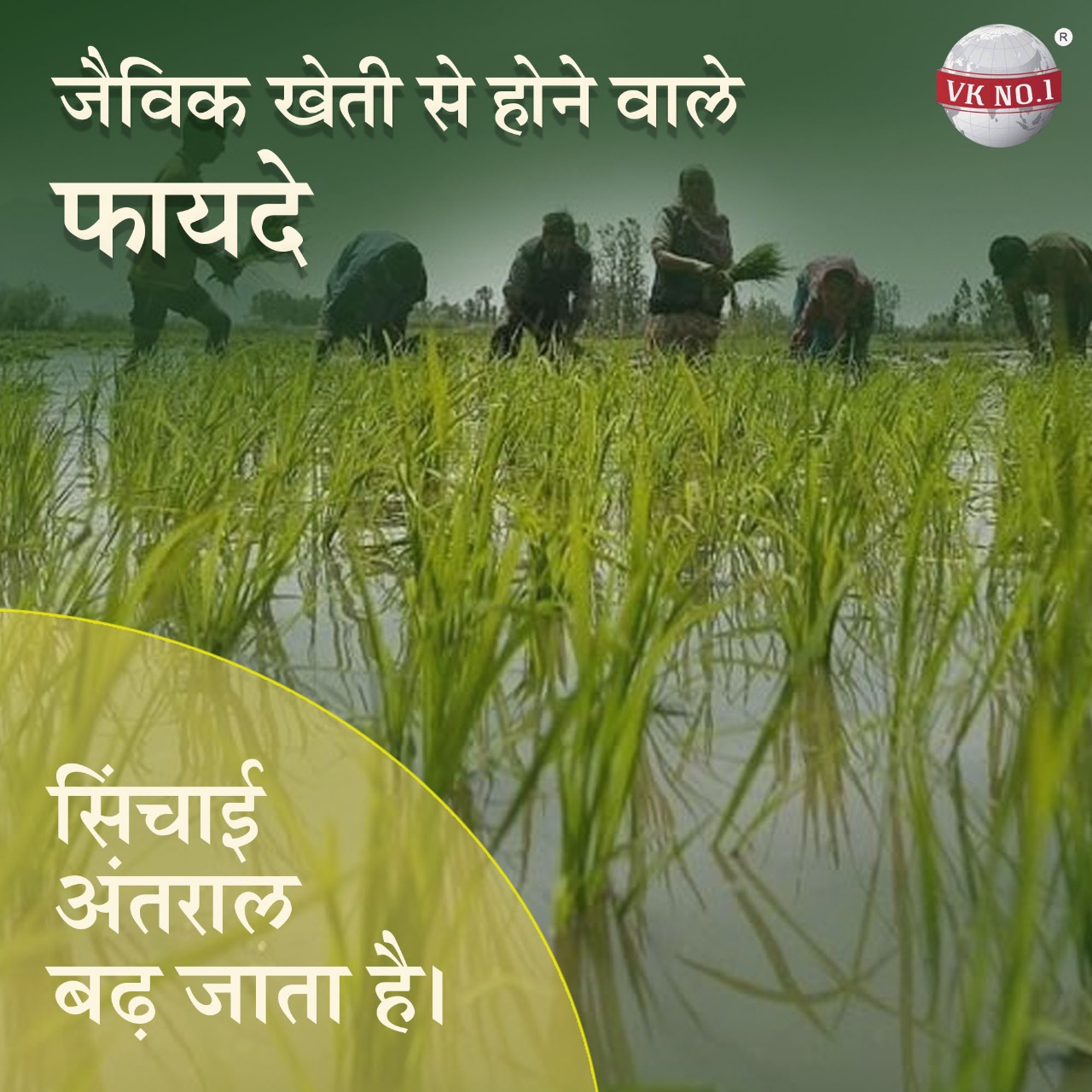
What is Organic Farming- Organic Farming in India
You all know very well that a balanced diet is very important to stay healthy. But in today's era, fruits, vegetables and grains prepared with the help of chemical fertilizers are constantly having a negative effect on our health. In such a situation, it becomes very necessary that we should encourage the coming generation along with us to do organic farming. Stay with us till the end. We are going to have a detailed discussion with you about organic farming (agriculture).
The increasing population of cheetah has become a serious problem for the whole world today. At the same time, there is a competition to supply food for all of them. The use of many types of chemical fertilizers, poisonous insecticides to produce more and more, badly affects both biotic and abiotic aspects of nature. As a result, there is a continuous decline in the fertility of the land, the polluted environment and the health of human beings.
Agriculture is the mainstay of rural economy in India. That is, agriculture is also the main source of income of the farmers. Since the time of Green Revolution, it is absolutely necessary to increase production in view of increasing population and income. Due to which chemical fertilizers and pesticides are being used in more quantity to produce more in less time. In which the cost is also high and the land, water and environment are also getting polluted. Even the food items are becoming poisonous. Until we understand the difference between organic farming and conventional farming, why is organic farming necessary? Wouldn't know the answer to this question.
That is why in order to deal with these problems, the government has recommended farming on the principle of continuous and sustainable farming for some years. Which the agriculture department of the states has continuously encouraged to adopt this type of farming, which we know as organic farming. The Government of India is continuously promoting to adopt this farming.
Anyway, the trend of organic food (food) is increasing in the world now. Now many countries have started growing about 10% of their production through organic farming. Many retail and supermarkets have also started reposing their trust on organic products.
In fact, traditional agriculture in India is completely based on chemical fertilizers and toxic pesticides. These toxic elements dissolve in our food supply and water sources. Also harm our livestock. Moreover, due to this the fertility of the soil gets reduced. If seen naturally, it also has a very bad effect on our environment. All these have a bad effect on our immunity. Therefore, it has become necessary for development that every possible effort should be made for the development of eco-friendly technology. Such technology is called 'organic farming'.
What is Organic Farming
Organic farming is a sustainable farming system that maintains the long-term fertility of the land and uses limited land resources to produce high quality nutritious food. It is the combined result of the development of biological technology, knowledge of multiple sciences, crop breeding, animal husbandry and ecology etc.
In organic agriculture, crop rotation, use of animal manure and waste manure, mechanical farming and natural integrated pest control are used. So that the fertile power of the land can be maintained. Plants can be supplied with nutrients according to their needs and insects, weeds and other pests can be controlled. Contains synthetic fertilizers, insecticides, growth regulators and animal feed additives.
In short "Organic agriculture is called that method of farming, under which the balance of the environment is restored and it is protected and promoted."
Today, to increase the supply of safe food all over the world, there is an increase in the demand for food produced from organic farming.
In other words, "Organic farming in india is such a method of agriculture, under which the use of synthetic fertilizers and synthetic pesticides is minimized. As a result, the fertility of the land is maintained. In this agriculture, crop rotation, green manure, compost etc. are used. Is used for."

In ancient times, farming was done according to the health of man and according to nature. As a result of which the balance of water, land, air and environment was maintained. Cow rearing was also done at that time. But this also decreased with time. The use of chemical fertilizers and pesticides started in agriculture. As a result of which the balance of the cycle of biotic and inorganic substances got disturbed and this imbalance continues.Is. This imbalance is becoming fatal for mankind.
Myths and Fallacies about Organic Farming In India
There are many misconceptions about organic farming in the society, which are especially seen between organic farming and traditional farming. Chief among these are the following
(1) Less production of organic farming as compared to chemical farming- It is believed that the production of organic farming is less than that of chemical farming. The production in chemical farming starts to be very high from the very beginning. Which is wrong to think.
(2) Organic farming is not economical - people's belief is also wrong. However, for making vermicompost , the labor cost of covering it with haystack and composting is high. However, the overall cost of cultivation is often less than that of chemical farming.
(3) By using waste manure, you cannot meet enough nutritional factors - there is no concept of feeding plants in organic farming. Rather the question here is to feed the land and keep it healthy and alive. Most of the work is done by countless organisms and micro-organisms that thrive on 'living' lands. The many uses of organic farming ensure that the fertile power of the land is always maintained.
(4) Only big farmers get monetary benefits from organic farming – It is said that organic market is only for big farmers, who are few in number. Because these farmers have access to specialized markets. Unless people are aware, it is difficult for every organic farmer to get high price for his produce.
The option of export market has been open for the last few years, but only those organic farmers will be able to take advantage of it, who will have a certificate of organic farming. At present some internationally recognized agencies are doing this work in India. These agencies inspect organic farms and issue certificates to them.
(5) Organic farming is not the use of chemical fertilizers and pesticides.
An important misconception is that organic farming is not the use of chemical fertilizers and pesticides. But it is not proper to think so in the real sense. Organic farming is concerned with maintaining the health of the land. That is, giving food to the land, not giving food to the plants. The best production is to be achieved, that too in an environment friendly manner using many techniques. Simply put, "Organic farming is to accept the responsibility of feeding the land if one is to be successful in agriculture."
.jpeg)
Quality of Organic Farming
We can understand the characteristics or quality of organic food from the following points-
(1) Organic food is more nutritious and contains less chemical substances and nitrate residues.
(2) Organic food may contain high levels of vitamins and micronutrients. Because the crop gets a better and balanced supply by getting natural supplements. Whereas due to artificial fertilizers, lime and magnesium dissolve in the soil in such a way that they cannot reach the plants.
(3) Organic food is generally more expensive to produce than non-organic food.
(4) A lot of fresh produce is wasted in meeting the needs of the supermarkets and the cost of distribution is high due to the small quantity. However, with the widening of the market size and the savings in scale, the prices of organic produce are expected to decline.
Advantage of Organic Farming In India
There are many benefits of doing organic farming. Nowadays, looking at the side effects of the products produced with the help of chemical fertilizers, if we assess, then the benefits of organic farming are visible only. Let us try to know the benefits of Organic Forming through the following points-
(1) Organic farmers do not use synthetic chemicals. These are petroleum based. Petroleum is a non-renewable resource.
(2) Higher amounts of secondary metabolites are found in organic crops than in conventional crops. In fact, it is a substance that is a part of the immune system of plants, which also proves helpful in combating diseases like cancer.
(3) More nutritious elements are found in the soil of organic farming.
(4) More biological activity and more biodiversity are found in organic farms.
(5) Many research shows that organic apple orchards, where no synthetic chemical pesticides or fertilizers are used, yield sweeter fruits and more benefits and soil Remains more healthy.
(6) There is little change in the rates of production of organic crops over time.
(7) The fertility of organic soil increases with time.
(8) High levels of vitamins are found in organic crops.
We will try to see the benefits of organic farming separately from the point of view of farmers, soil and environment through the following points-

Benefits of organic farming from the point of view of farmers
(1) The fertility of the land starts increasing.
(2) There is a continuous increase in the irrigation interval.
(3) The dependence on chemical fertilizers is reduced. As a result, the cost involved also comes down.
(4) There is a continuous increase in the productivity of crops.
Benefits of organic farming from the point of view of soil-
(1) The quality of the land is continuously improved by the use of organic manure.
(2) The water holding capacity of the land increases.
(3) The evaporation of water from the land becomes relatively less.
More about this source textSource text required for additional translation information
Benefits of organic farming In India from an environmental point of view-
(1) There is a continuous increase in the water level of the land.
(2) Pollution through water in soil, food items and land starts decreasing.
(3) The use of waste in making manure reduces diseases.
(4) The cost of production of crops decreases and the income starts increasing continuously.
(5) In the competition of the international market, organic products start meeting their quality.
Disadvantages of Organic Farming In India
Well, there are only benefits from organic farming. Negative effects of organic farming can also be seen socially. In general, the drawbacks of organic farming can be effective
But these defects cannot be called very harmful. Let us try to know the disadvantages of organic farming through the points given below.
(1) Organic produce is more expensive than non-organic. Organic farming is relatively expensive.
(2) Organic farming is more labour-intensive. That is, more labor is required in this type of farming.
(3) Animal manure is used in organic farming. Which harbors deadly bacteria. This requires special attention.
(4) The production of organic farming is 20% less than that of conventional farming. The government is making continuous efforts to promote it.
(5) Organic farmers from time to time have to bear the loss of the entire crop or a large part of it due to pests.
In the above points, we have learned about the advantages and disadvantages of organic farming in detail. But one thing is certain that the benefits of organic farming are more in our life. The losses don't seem to be that impressive.
Organic Farming and Environment In India
We want to tell you that there is a very good relationship between organic farming and environment. Organic farming is very good for the environment. Because this organic farming plays an important role in preserving the diversity of trees and wild animals. That is, it is very beneficial from the point of view of the health of crops and animals.
It is also beneficial for the land, it nourishes the land which is a resource for the future generation. Organic farming produces better, tastier and healthier food. Due to the use of artificial fertilizers on the land, its chemicals go into the ground water and rivers. The presence of nitrates in drinking water is very harmful for health.
That is, we can say that organic farming is better for both environment and health than conventional farming. Today the biggest problem related to the environment is the consumption of energy and the use of energy in organic farming is much less than traditional farming.
Positive aspects of organic farming
In view of today's random use of chemical fertilizers and the ill effects of them, if we look at the positive aspects of organic farming, then completely boycott of artificial fertilizers or use of fertilizers in very small quantities which can affect the land, water, animals, etc. And is beneficial for humans, can be called a big step on the path of change. In this way, we can definitely take a better step towards organic farming in terms of taking the social benefits of organic farming.
In the absence of soluble fertilizers, the amount of nitrate in organic farms is less than in conventional farming. Which is an important aspect. Biodiversity under organic farming always encourages the varieties of animals and plants, which are absolutely necessary for the future of all species on earth.
Apart from this, farmers doing organic farming play an important role in maintaining the habitat of all species and the environment around them. Organic farming releases much less carbon dioxide than conventional farming. Carbon dioxide is primarily a greenhouse gas, which is the reason for the warming of the earth, which destroys the habitat of pests.
.jpeg)
Conclusion
After knowing all the above important points, we can say that our organic system is getting destroyed due to the continuous use of chemical fertilizers in the fields. The land is also getting destroyed. At the same time, water pollution has also started reaching its peak. If we want to avoid the dangers coming in the future as well as today, then with the help of available organic means, we have to make fertilizers, insecticides and medicines for the control of rats etc. With these organic methods, we will start getting more crop yields.
Cereals, fruits and vegetables will also be chemical-free, that is, toxin-free and mixed well. One important thing is that the system of micro-organisms and organisms of nature will again be able to play a cooperative role in our agriculture. All these will have a direct effect on our immunity. Which is an important problem in today's time. Our immunity is continuously decreasing due to chemical food.
Hope this issue of ours today "Who is called organic farming? | Organic Farming in Hindi" will definitely prove beneficial for you. Along with this, you must have known in detail about the advantages, disadvantages, and necessity of organic farming. Hope this information of ours will definitely prove helpful for your study.